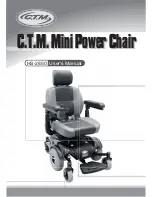
User Guide
Wheelchair ‘Kontiki’
Page 10 of 54
3 D
AILY USE
Generally speaking, every wheelchair is ready for use on leaving the factory. However,
for optimum comfort and ease of use it is recommended that the dealer or therapist
adjust the wheelchair to the personal characteristics and wishes of the user. See
“Adjustment” on page 18.
Before use read “Safety” on page 8.
3.1 O
VERVIEW OF OPERATING CONTROLS
Headrest (optional)
Push handgrips
Operating lever for tilt angle
adjustment
Push handgrip height
adjustment
Brake pedal and handle
Photo 3-1
Armrests
Legrests
Footplate
(foldable)
3.2 P
ARKING BRAKE
Applying the brake:
Push the brake pedal downward with your foot until the pedal remains in place.
The rear wheels are now locked.
Releasing the brake:
Lift the brake upward with your foot.
The brake can also be operated by hand.
Applying the brake:
Pull the brake handle to the rear.
Releasing the brake:
Push the brake handle forward.











































